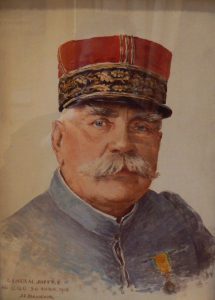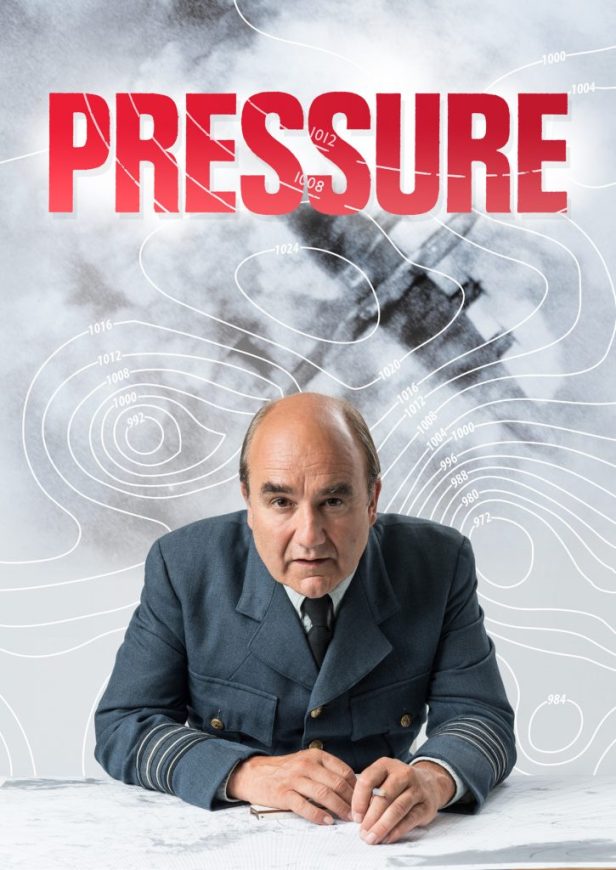
Finest Hour 182
Books, Arts & Curiosities – Heavy Weather

December 30, 2018
Finest Hour 182, Fall 2018
Page 48
Review by Jane Flaherty
Pressure by David Haig premiered in Edinburgh in 2014 and played at the Ambassadors Theatre, London, through 1 September 2018.
Jane Flaherty teaches history at Texas A&M University.
Pressure brings to life the taut, dramatic days before the launch of Operation Overlord. At the Southwick House headquarters in Portsmouth, England, Allied Supreme Commander General Dwight D. Eisenhower has assembled the Allies’ leading strategists to finalize plans for the cross-channel D-Day invasion. Included in the team are weather trackers led by American Colonel Irvin P. Krick and Scotsman Dr. James Stagg, portrayed with great intensity by the playwright himself David Haig. Keeping the group coordinated and Eisenhower focused during these tense days is Lieutenant Kay Summersby, Eisenhower’s driver, confidential assistant, and alleged paramour.
The play opens on Friday, 2 June 1944, with Stagg’s arrival at his spare room. Stagg complains to Summersby that he does not have all the “urgent” equipment he requested. “Everything, Dr. Stagg, is urgent,” she replies coolly in the most understated moment of the play. Indeed, “7,000 vessels, 160,000 ground troops, 200,000 naval personnel, 15 hospital ships, 8,000 doctors, and 4 airborne divisions” await Eisenhower’s signal to go, and Ike demands accurate forecasts from the team of meteorologists every four to six hours to fix the timing of the attack.

2025 International Churchill Conference
Enter Colonel Krick, the young and dashing “first celebrity weatherman.” Krick and Stagg disagree about the forecast for Monday, 5 June. Based on his study of the current weather patterns, Stagg recommends postponing the invasion, forecasting a storm on Monday. Krick believes they should launch as planned, predicting there will be calm seas and clear skies. Ironically the young, brash American relies on historical weather patterns to frame his recommendations, whereas the older, dowdier Stagg uses the latest scientific understanding of meteorology. Over the next four scenes, this interplay continues. Through the talent of the actors, the audience feels the tension and pressure mount as reports arrive, generals deliberate, and weathermen disagree.
As we know, Stagg’s analyis proved accurate. Early on 5 June there were wind gusts, rough seas, and a “helluva storm” over the Channel. Stagg predicted a break in the weather on 6 June, when the successful invasion finally launched. The tight script reveals the challenge of working through forces one cannot control; the movement of storms becomes central factors in determining the fate of millions. Haig’s play shows in deeply moving fashion how knowledge, tenacity, and humility can help shape history, despite the obstacles of nature.
As Kay Summersby, Laura Rogers unequivocally shows longing for Eisenhower despite his wooden and, at times, cold responses. The backstory of Stagg’s wife going into a difficult labor at a distant hospital is marred by the intrusive reality of Haig’s age. At the time of the D-Day launch, Stagg was forty-four years old; Haig is sixty-two. While his age served the story well as a counter to the younger, American antagonist, it proved a distraction here.
Finally, this script is not kind to the legacy of Eisenhower, portrayed here by Malcolm Sinclair. Ike blusters and curses, tries to understand the rules of rugby, speaks of vacationing with Summersby, then reminisces about his deceased son and longing for family. In Act Four, after the invasion has launched, Ike passes out after three drinks of single malt whiskey. In the final scene, Eisenhower curtly dismisses both Stagg and Summersby. “Lieutenant Summersby, good luck with your future. Would you excuse me,” he states, then turns and departs leaving Summersby heartbroken. In truth, Summersby worked beside Eisenhower through V-E Day. Her conflicting accounts of their wartime relationship have kept memoirists and historians speculating. Stagg wrote in his published diary that his assignment to the D-Day planning was temporary and that he continued to “cherish” the letter of gratitude Eisenhower sent him after returning to his regular duties and family.
Even though we know before the curtain rises how the story will end, the dialogue throughout the play is crisp and moving, and the performances by the talented actors kept the audience enthralled. The staging and lighting, particularly the displays of wall-sized weather charts and storms outside the French windows, were brilliant, and contributed to a great evening of theater.
Subscribe
WANT MORE?
Get the Churchill Bulletin delivered to your inbox once a month.





